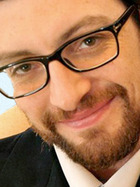
Naturally, I was stunned when the first of my many doctors told me that, at 28 years old, I had cancer. It’s a word none of us want to hear, especially given my devastating diagnosis of metastatic melanoma. I arrived at the third date with my now-wife Kathryn only to explain that, given my slim odds of survival, beginning a relationship didn’t seem prudent or fair. Obviously, she has stuck with me - we recently celebrated three years of our loving relationship, while solemnly marking the same three years since our battle against cancer began.
In fact, it was Kathryn who first received the support of CancerCare. A co-worker of mine had just lost her beloved sister to cancer, and she told us of the great solace and strength she had found through her caregiver support group at CancerCare. As far too many of us know, the cost of cancer is tremendous: there is the physical toll of invasive surgeries, debilitating treatments and the pain of long-term side effects; the financial burden can empty bank accounts with the cost of doctor’s bills, countless pills, and lost wages; and of course there is the emotional devastation: the challenging strain of managing a body in revolt, friends who disappear simply because they don’t know what to say, and families weighed down by grief and fear. It is not only the patient who is diagnosed with cancer – it is an entire community. For that reason, CancerCare’s support of caregivers is just as important as its support of those afflicted with the disease, and Kathryn is one of countless caregivers who have benefitted greatly from the organization’s services. Though her support group ended long ago, many of its members have continued to be in regular contact.
As for me, I sought support from CancerCare when the psychological burden of my treatment became too much to bear. I continued to work full-time through the first round of radiation, but when I began chemotherapy after my first recurrence, I simply couldn’t manage. My understandable anxiety was dramatically magnified by my sizable doses of steroids, and my “chemo brain” left me in a fog – I lacked mental clarity and focus, my short-term memory was in tatters, and I began to struggle with depression. My counselor at CancerCare helped me gather the pieces of my life and start to reassemble them. She led me to an on-site support group for young adults with advanced diagnoses. It was through CancerCare that I first discovered First Descents, a fantastic organization that takes young adult cancer survivors on wilderness adventures – I was lucky enough to spend a week last summer kayaking on the Colorado River outside of Vail.
My relationship with my counselor is one that I value greatly, and I would certainly not be where I am today without her help. She, and CancerCare, alongside my wife, family and friends – and of course, the extraordinary, talented and caring staff at NYU Clinical Cancer Center - have recently seen me through three clean scans in a row. I know that there are many more to come; if not, I know that CancerCare will be there through it all.
